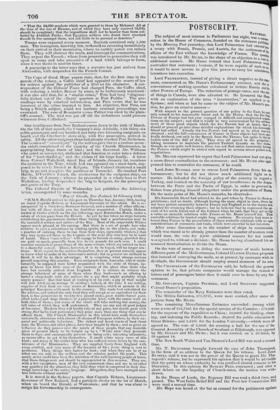Our intelligence from New Zealand comes down to the 24th
of March. On the 7th of that month, the Company's ship A delaide, with thirty-six cabin-passengers and one hundred and forty-two labouring emigrants on board, and the Glenbervie store-ship, with five passengers, arrived in safety. All the other emigrant ships had already reached Port Nicholson. The cession of " sovereignty" by the natives gave rise to a curious scene : the chiefs complained of the rapacity of the Church Missionaries, in appropriating large tracts of land ; and the Reverend Mr. Williams who acted as interpreter, abdicated that function to enter into a defence of his " land-sharking," and the claims of his large family. A letter from Colonel Wakefield, dated Bay of Islands, January 1st, mentions the accident to the Tory, which had run aground on a sand-bank, sup- posed to be newly formed at Kaipara. The Colonel chartered a small brig, to go and complete the purchase at Taranaki... He reached Port Hardy, D'Urville's Island, the rendezvous for the emigrant-ships, on the llth of January ; whence lie proceeded in a whale-boat to Port Nicholson, having despatched the brig to Kaipara, for the passengers and goods of the Tory.
The Colonial Gazelle of Wednesday last publishes the following letter, accompanied by some remarks.
"flay of islands, New Zealand, 3d February 1840.
" H.M.S. Herald arrived in this port on Thursday last, January 130th, having on board Captain Hobson, as Lieutenant-Governor of this island. He is ac- companied by a Secretary, Surveyor-General, and a number of. other officers : but with all those details you arc doubtless acquainted. Captain Hobson landed at twelve o'clock on the day following, upon Kororarika Beach, under a salute of eleven guns from the Herald. As yet he has taken no steps towards establishing his government, further than having had a proclamation read to the assembled settlers and natives of the Bay. Most of the respectable Whites appear much pleased nt his coming. But there is a set of people here who contrive to earn a subsistence by vending spirits, &c. to the sailors, and make a practice of enticing them to rums from their ships, (generally whalers,) that they may again sell thew to the Captain of the next ship who may be in want of hands. These 'rune-sellers' ' will engage to furnish so many, provided they are paid so much, generally from live to six pounds for each man. I could mention numberless proceedings of the same nature, which are carried on here to a shameful extent. These, however, it is to he hoped, will uo longer con. thine. With regard to the natives themselves, they at present scarcely appear to know what to make of the Governor's arrival ; but in general arc inclined to think it will be to their advantage. It is surprising what strange notions prevail respecting this country. Even emigrants from Australia, who it might naturally be supposed were better acquainted wills the state of timings, ap- pear to know but little more of the customs of the place than those who have but recently arrived from England. It is curious to witness the strange behaviour of some of them when they land—such as offering to barter a clasp-knife with the natives for a pig that might probably weigh ninety pounds: But that kind of trading is at an end; a pig of that weight will now fetch on an average 11. sterling: indeed, at the time I am writing, supplies of that kind arc very scarce at Kororarika, which at present is the principal European settlement in the country. The trade best calculated for the natives, and indeed the only kind they will accept as an equivalent fur their land, is tine gunpowder in twenty-five pound casks, good double-barrel gnus, (flint locks,) and large blankets of a particular kind, with the coarse wool on both sides of them ; and many of the chiefs will take nothing but money, the full value of which they welt understand. They arc one and all good judges of fire-arms. Muskets they will hardly take at any price, but double guns with strong flint locks (not percussion) they prize more than any thing that can be offered them. The Church Missionaries in this island have made themselves universally obnoxious with almost all classes of European settlers, by their un• social and unfriendly behaviour. The richest and finest tracts of land about here, the Thames, and other places, have been bought by them ; and so great an influence do they possess over the minds of these people, that any desirable piece of ground likely to lie bought up by a 'White man' they persuade them to tap', and consequently prevent its being sold; intending ultimately, as means offer, to get it for themselves. I could relate many cases of this kind ; and many is time settler here who has suffered severe losses by the con- trivance of the Missionaries. They arc supplied freely from England with every comfbrt, and very many of the luxuries of life; every thing is sent in profusion. These things they barter for land ; and when they can be of no other use, are sold to the settlers, and the mission pocket the profit. This surely never could have been the intention of the well-meaning people at home, that those things sent out should be appropriated in this manner. They are, with a few exceptions, men of the very commonest class, and are in no other way qualified for the situations they hold than what is comprised in their tho- rough knowledge of the native language. Altogether, they have managed mat- ters hitherto without control."
It is stated in the Sydney papers, that Captain Hobson, Lieutenant- Governor of New Zealand, had a paralytic stroke on the 1st of March, when on board the Herald, at Waitemata ; and that he was about to resign his Governorship in consequence.


























 Previous page
Previous page